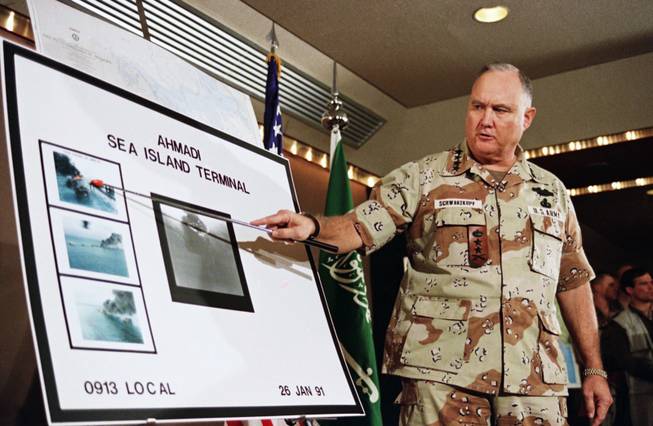
ASSOCIATED PRESS
In this Jan. 27, 1991, file photo, U.S. Army Gen. Norman Schwarzkopf points to row of photos of Kuwait’s Ahmadi Sea Island Terminal on fire after a U.S. attack on the facility. Schwarzkopf died Thursday, Dec. 27, 2012, in Tampa, Fla. He was 78.
Thursday, Feb. 28, 2013 | 12:19 p.m.
WEST POINT, N.Y. — Gen. Norman Schwarzkopf, the no-nonsense Desert Storm commander famously nicknamed "Stormin' Norman," graduated from the U.S. Military Academy at West Point, soaking up it values: "Duty, Honor, Country."
He married here. He taught here. And on Thursday he was buried here.
His family and friends joined Kuwaiti officials, former Secretary of State Colin Powell, former Vice President Dick Cheney, gray clad cadets and a detail of New Jersey state troopers for a memorial service in the academy's gothic chapel Thursday afternoon. His remains were buried afterward at the cemetery on the grounds of the storied military institution.
"Norman Schwarzkopf, Class of '56, welcome home," Powell said during the service.
Schwarzkopf commanded the U.S.-led international coalition that drove Saddam Hussein's forces out of Kuwait in 1991, when Powell was chairman of the Joint Chiefs of Staff. He was 78 when he died of complications from pneumonia in Tampa on Dec. 27.
Though lauded as one of the brighter lights of the "Long Gray Line," his daughter, Cindy Schwarzkopf, recalled him as a loving family man equally at home in palaces and camping tents. Her voice choked with emotion, she said that while Americans knew him as the no-nonsense man in the desert camouflage, his children remember him dressing as a clown and doing magic tricks for children's parties.
Schwarzkopf graduated from West Point in 1956 and later served two tours in Vietnam, first as an adviser to South Vietnamese paratroops and later as a battalion commander in the U.S. Army's Americal Division. While many disillusioned career officers left the military after the war, Schwarzkopf stayed to helped usher in institutional reforms. He was named commander in chief of U.S. Central Command at Tampa's MacDill Air Force Base in 1988.
The general's "Stormin' Norman" nickname became popular in the lead-up to Operation Desert Storm, the six-week aerial campaign that climaxed with a massive ground offensive Feb. 24-28, 1991. Iraqis were routed from Kuwait in 100 hours before U.S. officials called a halt.
Schwarzkopf spent his retirement years in Tampa. While he campaigned for President George W. Bush in 2000, Schwarzkopf maintained a low profile in the public debate over the second Gulf War against Iraq.
Schwarzkopf was buried near his father, Col. H. Norman Schwarzkopf, the founder and commander of the New Jersey State Police. The academy cemetery also holds the remains of such notable military figures as Gen. William Westmoreland, Lt. Col. George Custer and 1st Lt. Laura Walker, who became the first female graduate killed in action when she died in 2005 in Afghanistan.
Schwarzkopf and his wife, Brenda, had three children: Cynthia, Jessica and Christian.

Join the Discussion:
Check this out for a full explanation of our conversion to the LiveFyre commenting system and instructions on how to sign up for an account.
Full comments policy